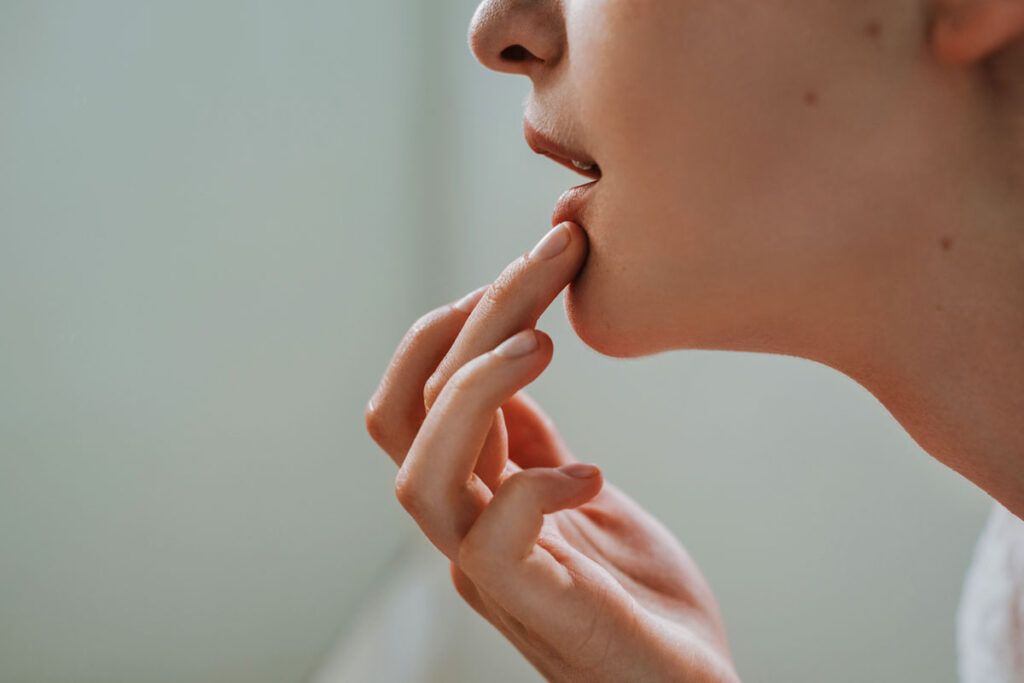Doctors also refer to eczema on the lips as lip dermatitis or eczematous cheilitis. Eczema refers to a wider group of skin conditions that can cause itchiness, scaling, and blisters on the skin. People can experience eczema anywhere on their bodies, including the lips.
People with eczema usually go between periods where they do not experience any symptoms and flare-up periods where the eczema comes back. Environmental and genetic factors can trigger eczema, including using certain lip products.
Causes

Eczema on the lips can crop up for many different reasons. People may develop eczema due to genetics or after being in contact with certain substances they may be allergic to. Other types of eczema can develop because of an infection. Some causes of eczema on the lips include:
- having a family history of eczema
- allergies
- stress
- cold or hot weather
- changes in hormone levels
- having a cold
- use of irritating substances
Eczema on the lips may develop after you have been in contact with triggers, such as:
- mouth-related products, including lipstick, lipgloss, or toothpaste
- cigarette smoke
- soaps
- fragrances
- cleaning products
- pollen
- sweat
- certain foods you may be allergic to
People may develop different types of lip dermatitis, including:
- Allergic contact cheilitis: This usually happens due to an allergic reaction to lip products, medications, toothpaste, or other dental products.
- Angular eczematous cheilitis: This develops due to a bacterial or fungal infection. This type of eczema of the lips is common in people with diabetes. Wearing dentures and braces or lip licking may increase the risk of developing angular cheilitis because these can promote the buildup of saliva in the corners of the mouth and this can promote infections.
- Irritant contact cheilitis: This type of allergic reaction occurs due to external irritation. This may include actions such as lip licking, using cosmetics, or other environmental factors such as pollen and cigarette smoke.
Symptoms
Eczema may occur on only one or both of your lips. Cheilitis may not only affect the skin outside of your mouth, but it can also involve the skin inside and around it. If you have lip dermatitis you may experience symptoms such as:
- dryness
- skin rash on and around the lips
- itching
- burning
- pain
- formations of scales
- flakiness
- inflammation
People with eczema on the lips — differently from people with dry lips — not only have dryness on their lips, but they also usually have swelling and scales.
Treatments
The treatment options for eczema on the lips may include:
- topical medications
- topical moisturizers
- lip balms
- oral antifungal medications like itraconazole (Sporanox), fluconazole (Diflucan), and ketoconazole (Extina)
- topical or oral antibiotics like nafcillin (Nallpen) and oxacillin (Bactocill)
- topical steroid ointment if the skin is inflamed
- clotrimazole lozenges
You should not use topical medications, creams, and moisturizes inside the mouth. Take care when using them around that area and speak with a healthcare professional if you have any concerns.
A 2022 study on people with atopic cheilitis stated that people treated with dupilumab (Dupixent) had a significant benefit and reduction of their symptoms. Dupilumab improved dryness and skin irritation and helped restore the skin around the mouth and on the lips.
A 2020 study suggests that treating people with eczema on the lips with topical tacrolimus 0.03% (Protopic) resulted in a complete recovery from the symptoms of eczema.
People may also find relief from eczema symptoms with some home remedies and by preventing exposure to their eczema triggers, including:
- Know what triggers your eczema: Limiting your exposure to chemicals or allergens that may be in certain cosmetic products or kinds of toothpaste might help you prevent flare-ups. Avoiding contact with foods that you are allergic to may also reduce the risk of eczema on the lips.
- Acupuncture: This can help you improve your relaxation and reduce stress levels. High levels of stress can trigger eczema.
- Diet: Eating a balanced and healthy diet, preferring organic foods, and avoiding processed ones may help with eczema.
- Hypnotherapy: This treatment may help reduce and manage stress. Reduced levels of stress may help decrease the risk of developing eczema flare-ups.
- Natural therapies: Moisturizing your skin with coconut oil may help eczema. Sunflower seed oil may also help relieve itchiness and allow your skin to restore.
- Vitamin D supplements: People with severe cases of eczema often have low levels of vitamin D in their bodies. Vitamin D supplements may help reduce the risk of eczema.
A doctor can recommend you the most appropriate treatment for your eczema based on its severity and the symptoms you experience.
If you need help covering the cost of medications, the free Optum Perks Discount Card could help you save up to 80% on prescription drugs. Follow the links on drug names for savings on that medication, or search for a specific drug here.
